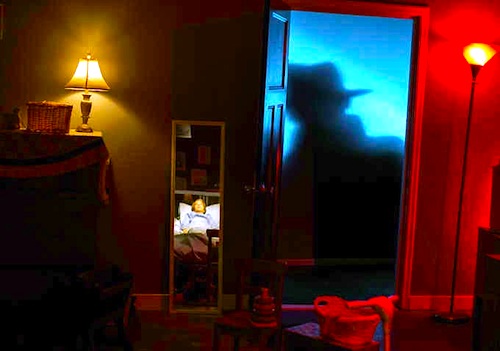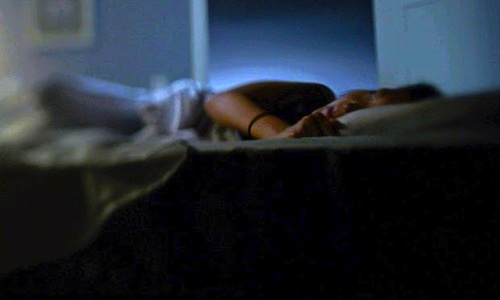
By Joe Bendel. It is not a good idea to nod off during this film. You might encounter one of the subjects. Fortunately, it will be very difficult to drift off during one of the scariest documentaries you will ever see that isn’t about Scientology. Shaking it off at bed time will be a different matter. Filmmaker Rodney Ascher documents the very real phenomenon of sleep paralysis and the terrifying figures often seen by those who suffer from it in The Nightmare, which screened during the 2015 Sundance Film Festival.
Like his interview subjects who agreed to appear on camera, Ascher (the co-director of Room 237) has personally experienced sleep paralysis. Medical professionals generally acknowledge it involves the conscious sensation of rigid immobility, until the afflicted sleeper manages to rouse themselves out of it. Of course, there is more to the story. Those who have endured persistent sleep paralysis often report seeing and sometimes hearing dark, menacing figures. Typically, these are the “Shadow Men,” often observed acting under the direction of the “Hat Man.”
This might sound fantastical, but Ascher has multiple sources attesting to these demonic dream stalkers. Indeed, there is something deeply archetypal about them, especially Hat Man, who can be seen as a forerunner to Freddy Kruger buried deep within our collective subconscious.
While Nightmare adheres to the standard accepted form of documentary films, Ascher’s dramatic recreations of participants’ nightmare encounters are genuinely frightening. Everything about them represents superior horror film mechanics, from the eerie lighting to the evocative set design. This film will scare you in the moment, but it will also challenge your safe assumptions regarding the nature of reality. Clearly, Hat Man is real enough for a considerable number of people out there, so what does that mean for our world view?

Yet, Ascher does not leave us bereft of hope and deprived of sleep. Surprisingly, Nightmare will hold considerable interest for evangelical audiences, who are not likely to be amongst the film’s target demographic. Nonetheless, one subsequently empowered Christian discovered she could vanquish her sleep demons by invoking a name. No spoilers, but his initials are “J.C.”
This is the rare sort of film that really gets under your skin and stays there. Ascher takes familiar New Age tropes and transforms them into something profoundly dark and threatening. The suggestion that sleep paralysis can be transmitted from person to person, essentially through the telling, is particularly disturbing for obvious reasons. Conveniently, nobody has time to sleep at Sundance. Presumably, Nightmare harbors no long-term ill effects, but it is exceptionally creepy. Very highly recommended for brave genre fans, The Nightmare screened as part of this year’s Sundance Film Festival.
LFM GRADE: A
Posted on February 1st, 2015 at 9:58am.